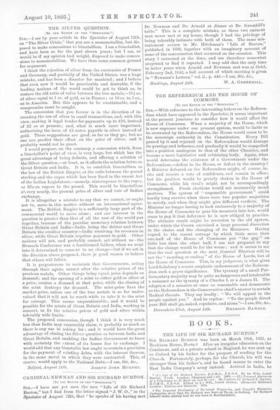THE SILVER QUESTION.
LTO THR EDITOR OP THE " SPECTATOR."] see by your article in the Spectator of August 12th, on "The Silver Crisis," that you are a monometallist, but dis- posed to make concessions to bimetallism. I am a bimetallist, and have been so for the past eleven years; but I am, or would be if my opinion had weight, disposed to make conces- sions to monometallism. We have thus some common ground for argument.
I think the rejection of silver from the currencies of France and Germany, and partially of the United States, was a huge mistake, and has been a disaster for mankind ; and I believe that even now it would be practicable and desirable, if the leading nations of the world could be got to think so, to restore the old ratio of value between the two metals,-154 oz. of silver equal to 1 oz. of gold, as in France; or 16 oz. to 1 oz., as in America. But this appears to be unattainable, and a compromise must be sought.
The concession that you favour is in the direction of in- creasing the use of silver in small transactions, and, with this view, making it legal tender for payments up to £10, instead of £2 as at present; and, what is much more important, authorising the issue of 21.notes payable in silver instead of gold. These suggestions are good, so far as they go; but no one can predict their effect on the price of silver, and it probably would not be great.
I would propose, on the contrary, a concession which, from a bimetallist's point of view, is very large, but which has the great advantage of being definite, and offering a solution of the Silver question,—at least, as it affects the relation between Great Britain and India. It is, to establish bimetallism as the law of the British Empire, at the ratio between the pound sterling and the rupee which has been fixed in the recent Act of the Indian Legislature,—namely, sixteenpence to the rupee, or fifteen rupees to the pound. This would be bimetallism M,very nearly, the present price of silver and rate of Indian exchange. It is altogether a mistake to say that we cannot, or ought not to, move in this matter without an international agree- ment. The British Empire is a sufficiently large part of the commercial world to move alone ; and our interest in the question is greater than that of all the rest of the world put together, because of the peculiar monetary relation between Great Britain and India—India being the debtor and Great Britain the creditor country—India receiving its revenues in silver, while Great Britain requires payment in gold. Other nations will not, and probably cannot, act without us—the Brussels Conference was a foredoomed failure, when we went into it determined to consent to no change—but if we act in the direction above proposed, there js good reason to believe that others will follow.
It is preposterous to maintain that Governments, acting through their mints, cannot alter the relative prices of the precious metals. Other things being equal, price depends on demand ; and the opening of a mint to either gold or silver at a price, creates a demand at that price, while the closing of the mint destroys the demand. The mint-price fixes the market-price, unless one of the two metals is so far under- valued that it will not be worth while to take it to the mint for coinage. This seems unquestionable ; and it would be possible for the mints of Great Britain and India, working in concert, to fix the relative prices of gold and silver within tolerably wide limits.
The proposed concession, though I think it is very much less than India may reasonably claim, is probably as much as there is any use in asking for ; and it would have the great advantage of ()losing the Silver question as between India and Great Britain, and enabling the Indian Government to know with certainty the extent of its losses due to exchange. I would add that any bimetallic law ought to contain a provision for the payment of existing debts, with the interest thereon, in the same metal in which they were contracted. This, of course, would apply to the National Debt.—I am, Sir, &c.,


































 Previous page
Previous page